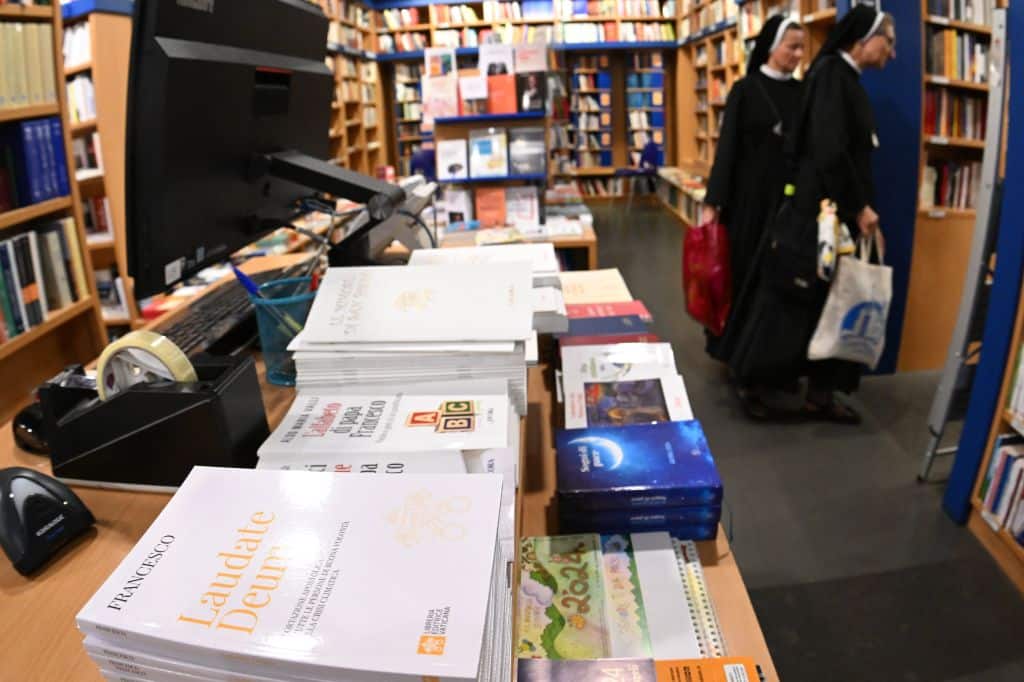Pope Francis has written a comprehensive and deeply personal letter on the important role of literature in the formation of priests but also for all Christians who increasingly encounter “toxic” media narratives.
Written on 17 July and published by the Vatican on Sunday 4 August, the <a href="https://www.vatican.va/content/francesco/en/letters/2024/documents/20240717-lettera-ruolo-letteratura-formazione.html"><mark style="background-color:rgba(0, 0, 0, 0)" class="has-inline-color has-vivid-cyan-blue-color">letter</mark></a> underscores the “value of reading novels and poems as part of one’s path to personal maturity” and also as a means to counter the toxicity, superficiality and violence that dominates so much of the news cycle nowadays. Based on that context, the Pope emphasises that the letter is addressed not just to those in formation but to all Christians, urging them to, in effect, pick up a good book.
“I very much appreciate the fact that at least some seminaries have reacted to the obsession with ‘screens’ and with toxic, superficial and violent fake news, by devoting time and attention to literature,” the Pope writes.<br><br>“They have done this by setting aside time for tranquil reading and for discussing books, new and old, that continue to have much to say to us. Regrettably, however, a sufficient grounding in literature is not generally part of programmes of formation for the ordained ministry."<br><br>The Pope laments that literature is too often “considered merely a form of entertainment”, a “minor art” and “non-essential” in the education of future priests and their preparation for pastoral ministry.
“I consider it important to insist that such an approach is unhealthy," the Pope says. "It can lead to the serious intellectual and spiritual impoverishment of future priests, who will be deprived of that privileged access which literature grants to the very heart of human culture and, more specifically, to the heart of every individual.”<br><br>The Pope recalls his time as a 28-year-old literature teacher at a Jesuit high school in Argentina when he tried to persuade his students to broaden their reading from contemporary authors to include the likes of <em>El Cid</em>, a Spanish epic poem from the 1100s, <a href="https://www.thetimes.com/comment/the-times-view/article/the-times-view-on-popes-reading-tips-catholic-tastes-w969r5qhf"><mark style="background-color:rgba(0, 0, 0, 0)" class="has-inline-color has-vivid-cyan-blue-color">reports</mark></a> <em>The Times</em>.<br><br>The strategy was a success, with the Pope recalling that his pupils developed a more comprehensive taste for literature and poetry.<br><br>"I, for my part, love the tragedians because we can all embrace their works as our own, as expressions of our own personal drama,” the Pope writes. “In weeping for the fate of their characters we are essentially weeping for ourselves, for our own emptiness, shortcomings and loneliness."
In his letter, the Pope highlights how the French novelist Marcel Proust observed that literature could cram the experience of years of life into a few hours of reading.
He also highlights the literary enthusiasm of C.S. Lewis, and his authoring of <em>The Chronicles of Narnia</em> while being a staunch defender of Christianity in the first half of the 20th century. The Pope notes the point that Lewis made, in regard to the mind-expanding powers of reading, when writing in <em>An Experiment in Criticism:</em> <br><br>"In reading great literature I become a thousand men and yet remain myself. Like the night sky in the Greek poem, I see with myriad eyes, but it is still I who see. Here, as in worship, in love, in moral action and in knowing, I transcend myself; and am never more myself than when I do."<br><br>The Pope writes that the essays and poems of T.S. Eliot “have an outstanding place in modern literature” and that they “perceptively described today's religious crisis as that of a widespread emotional incapacity". <br><br>As he brings his letter to a close, the Pope sums up the "spiritual power of literature" that can be harnessed by priests:<br><br>"I have emphasised the role that literature can play in educating the hearts and minds of pastors and future pastors. Literature can greatly stimulate the free and humble exercise of our use of reason, a fruitful recognition of the variety of human languages, a broadening of our human sensibilities, and finally, a great spiritual openness to hearing the Voice that speaks through many voices."<br><br>Though he again notes the relevance this has for all Christians: “Literature helps readers to topple the idols of a self-referential, falsely self-sufficient and statically conventional language that at times also risks polluting our ecclesial discourse, imprisoning the freedom of the Word.”
The spiritual power of literature, the Pope says, “brings us back to the primordial task entrusted by God to our human family: the task of 'naming' other beings and things (cf. <em>Gen</em> 2:19-20)", adding:
"Priests are likewise entrusted with this primordial task of 'naming', of bestowing meaning, of becoming instruments of communion between creation and the Word made flesh and his power to shed light on every dimension of our human condition.
“The affinity between priest and poet thus shines forth in the mysterious and indissoluble sacramental union between the divine Word and our human words, giving rise to a ministry that becomes a service born of listening and compassion, a charism that becomes responsibility, a vision of the true and the good that discloses itself as beauty.”<br><br>In the final line of his letter, the Pope leaves it to the words of the Romanian-born French poet Paul Celan:<br><br>“Those who truly learn to see, draw close to what is unseen.”<br><br><strong>RELATED: <a href="https://catholicherald.co.uk/very-odd-the-way-in-which-mainstream-media-reported-on-last-supper-parody-at-olympics/?swcfpc=1"><mark style="background-color:rgba(0, 0, 0, 0)" class="has-inline-color has-vivid-cyan-blue-color">Very odd: The way mainstream media ‘reported’ on Last Supper parody at Olympics</mark></a></strong>
<em>Photo: The book 'Laudato Deum' ('Praise Be To You'), a thesis by Pope Francis on climate change is pictured in a book shop the day of its release, near The Vatican, 4 October 2023. (Photo by ANDREAS SOLARO/AFP via Getty Images.)</em>


